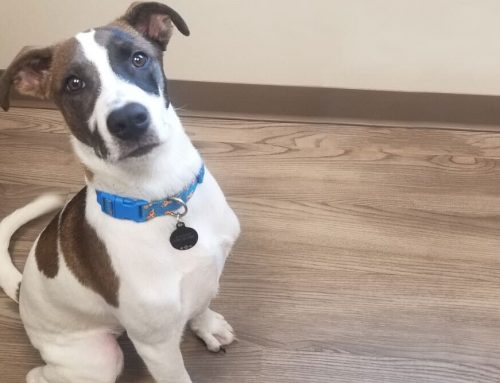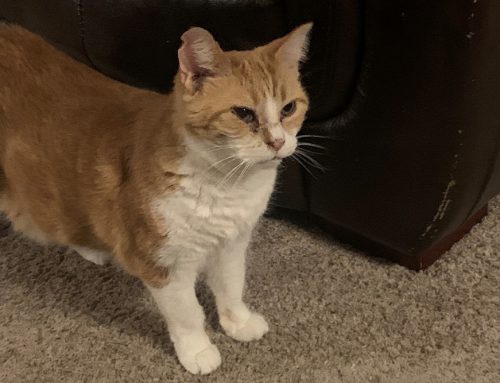Sometimes pairing integrative therapies with traditional veterinary medicine can be the best way to treat pets. When Molly developed what at first seemed like a mysterious illness, Dr. Kristin BeVirt Patneaude and Molly’s owners had to determine what was causing her troubles so she could be treated.
Molly was only 6 years old when she suddenly developed diarrhea. The origin of the labrador retriever’s bowel issues was confounding. “Routine fecal samples were negative for parasites,” said Patneaude. “She didn’t respond to first-line treatments like probiotics or prescription intestinal diets. We tried antibiotics to address reducing intestinal spasms and certain bacterial overgrowths. That didn’t solve the problem either.”
Bloodwork showed she had very low levels of multiple proteins in her blood, she said. “That was consistent with an inflammatory disease that prevented her from absorbing those proteins. Additional testing showed the diarrhea had also led to her becoming deficient in vitamin B12, but that still did not give a cause of her symptoms.”
When none of the treatments they tried worked, Patneaude prescribed a hydrolyzed kibble diet to see whether Molly had a food allergy. “Hydrolyzed diets are foods in which the protein is broken down into very small molecules. Molly’s immune system would be less likely to react to it if a food allergy was present,” said Patneaude.
At the same time, Patenaude customized a liquid herbal formula designed to support a healthy immune response in Molly’s intestines. The formula included some herbs with antimicrobial properties to reduce any bacterial overgrowth and others that support healing the gut lining. Additionally, it contained herbs to help reduce spasms in the gut and support healthy liver function.
“Molly continued the probiotic, antibiotic and vitamin B12 injections,” said Patenaude. “Additionally, she had a long history of year-round skin allergies controlled with Apoquel, which blocks a chemical in the skin that transmits the itch signal to the brain.”
Molly started to heal. After six weeks on the herbal formula and new diet, her stools become more formed and there was some improvement in her blood protein levels. Still, her stools and blood protein levels weren’t normal. “Her symptoms plateaued over the following months, so I recommended she see an internal medicine specialist for an abdominal ultrasound and upper gastrointestinal endoscopy,” said Patneaude.
“The specialists would look at the lining of Molly’s stomach and biopsy her intestine. It turned out the biopsies revealed Molly had irritable bowel disease (IBD) and lymphangiectasia, a rare digestive disorder. Once the diagnosis was confirmed, Molly changed to a prescription low-fat diet she’d be better able to tolerate,” said Patneaude.
The next step was giving her a medication to reduce the inflammation in her intestines. She continued her herbal formula, but Patneaude recustomized it so the focus would be more on supporting gut healing and liver function. The steroid treatment was working to reduce inflammation in her intestines, so she no longer needed the antibiotics.
It took several months, but eventually her protein levels returned to normal, and Patneaude decreased the steroids, which were causing side effects. “That’s when we decided to explore whether an alternative approach might be good for Molly,” she said. “Microbiome testing is a newer area of research. The stool is evaluated in its entirety to examine the organisms that make it up and look for overgrowths of pathogenic bacteria that can cause disease.”
Molly’s test revealed her stool had a significant overgrowth of pathogenic E. coli bacteria, and she was low in bacteria that have anti-inflammatory properties in the skin and digestive tract. “Molly then underwent a fecal microbiome transplant (FMT), which involved a 30-day course of oral capsules containing fecal matter from healthy donor dogs,” said Patneaude. The goal was to reduce the E. coli overgrowth and add the healthy bacteria. At the time of her testing, she was symptom free, but she still had significant imbalances capable of causing disease.”
Once again, a diet change was in order. Molly transitioned to a freeze-dried, whole-food diet. “I readjusted her custom herbal formula to support a healthy immune response, liver detoxification and lessen her allergy symptoms,” said Patneaude. “She also started on Omega 3 fish oil.”
When she was retested several months later, her E. coli levels had returned to near normal, and the levels of beneficial bacteria in her gut were improved. At that point, she was weaned off the steroids and stopped taking Apoquel. Even though Molly still experiences seasonal allergies, when her skin becomes inflamed, she is now treated with topical medications.
“Molly is an excellent example of how traditional medical management can be enhanced with integrative therapies to achieve the pet’s best life,” she said. Patneaude is passionate about holistic complements for traditional veterinary medicine. She has enhanced her veterinary skills by becoming certified in Western herbal medicine and in acupuncture. Those skills paid off with the loving lab who underwent such challenging health issues. “Now,” said Patneaude, “Molly is a happy 8-year-old pooch living her best life.”
For more information or to schedule an appointment, visit https://greendalevillagevet.com/ or call 414-421-1800.








Leave A Comment